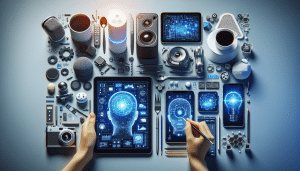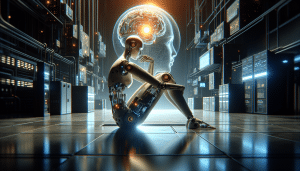Exploring What AI Means For Everyday Life
Aiden Foster October 22, 2025
Artificial intelligence is everywhere, from your smartphone to the workplace. Unpacking how AI works, where it’s headed, and what it brings to daily life helps make sense of exciting changes shaping the world. Get an insider look at the impact, risks, and opportunities of AI technology.
AI Fundamentals: Concepts and Applications
The world talks about artificial intelligence constantly, but what exactly is AI? At its core, AI refers to machines and computer systems built to imitate cognitive functions. These include things like learning, problem solving, pattern recognition, and adapting to new information. Instead of being directly programmed for each specific task, AI systems learn from data and experiences. Think of the way your email app automatically detects spam or a streaming service recommends shows—these are real-life examples of AI applications using algorithms trained on large datasets to deliver personalized results. AI enables computers to identify patterns in data and make predictions, and those capabilities power many daily conveniences people often take for granted.
Machine learning, a subset of AI, gives systems the ability to improve at tasks over time with more data. Supervised learning, unsupervised learning, and deep learning each offer unique benefits depending on the problem. For instance, self-driving car technology integrates many forms of AI: image recognition to read traffic signs, sensors to judge speed and distance, and natural language processing for voice commands. As AI continues to evolve, more applications emerge—including voice assistants, smart thermostats, and even fraud detection in banking. The goal is to make machines smarter and more helpful, responding to subtle cues in human environments.
What makes AI truly transformative is its adaptability. Unlike traditional programming, where rules are fixed, AI systems continuously adapt to new information. As more data flows into the system, the accuracy and usefulness of AI-driven tools improve. This means that, over time, predictive text in your emails or recommendations on shopping sites become more relevant to you personally. The fusion of AI with cloud computing, big data analytics, and advanced robotics is shaping new possibilities across industries, opening doors to further innovation and efficiency.
How AI Shows Up in Daily Routines
AI is no longer a far-off futuristic concept—it affects daily routines in visible and invisible ways. Smart home systems, such as thermostats that learn a household’s preferred temperature schedule, leverage machine intelligence for comfort and energy savings. Search engines and voice assistants like Alexa or Siri also operate with sophisticated natural language processing engines, making it easy to find information or control devices with simple voice commands. These tools constantly analyze speech patterns and context to increase their understanding, all thanks to advances in AI.
Shopping experiences have drastically changed as well due to artificial intelligence technologies. Online stores rely on AI-driven recommendation engines that suggest what to buy next, based on browsing history, previous purchases, and even your location data. These systems process behavioral patterns at a massive scale to enhance user engagement. AI is also empowering fraud detection and security in banking and finance. Algorithms flag unusual activity, safeguarding users from possible threats—an essential benefit that works quietly behind the scenes.
The influence of AI goes beyond gadgets and apps. AI-powered translation tools break language barriers for work, travel, or study. In healthcare, smart algorithms help doctors analyze medical images and predict possible health risks. Even video streaming platforms utilize AI to optimize video quality based on internet speed or your viewing habits. While many individuals might not even notice AI at work, its impact roots deeper every day, changing habits and simplifying complex tasks.
Benefits of AI in Society, Science, and Business
Across society, AI’s benefits range from increased productivity to discoveries in science and medicine. Businesses use AI to analyze consumer trends, automate workflows, and streamline logistics, reducing manual labor and boosting accuracy. AI’s data-processing power allows companies to forecast demand, improve customer service, and identify new market opportunities. This scalability creates more time for creative problem-solving and strategic decision-making in many workplaces.
In science, AI supports breakthroughs in genetics, climate modeling, and astronomy. Researchers train AI models to spot hidden patterns in data, which accelerates discoveries and improves outcomes. Medical professionals harness AI to detect diseases earlier, personalize treatment plans, and analyze research data at unprecedented speeds. These advances are increasingly referenced in peer-reviewed studies and government reports, showing the real-world value of AI when applied responsibly and ethically.
Socially, AI can make life more accessible. Speech-to-text and voice recognition tools empower people with disabilities to communicate, work, or learn more independently. Urban planners use AI-driven simulations to optimize traffic flows, reduce congestion, and plan sustainable cities. Even weather forecasts now employ advanced algorithms to improve accuracy, helping communities prepare for natural disasters. The positive impact is clear, but ethical and privacy considerations must always be balanced with technological advances.
Key Challenges and Ethical Concerns
While AI delivers many advantages, its rapid growth also raises important questions about fairness, bias, and accountability. One major challenge is algorithmic bias, where AI systems unintentionally learn and amplify biases embedded in historical data. For instance, facial recognition applications have shown varying accuracy across ethnicities and genders, sparking global conversations about fairness and responsibility. Ensuring AI systems are transparent, predictable, and regularly audited is crucial to prevent unintended harm.
Data privacy and security also emerge as critical concerns. AI systems depend on enormous amounts of personal data to function effectively—shopping preferences, health histories, and location data, to name a few. Protecting user data from misuse or breaches requires robust legal frameworks and constant vigilance. Regulatory bodies and international organizations are working on standards to ensure ethical AI, but this remains a complex, evolving field that affects both individuals and industries alike.
Accountability in AI is another pressing topic. When a smart system makes a suggestion or a decision—such as denying a loan or detecting a medical anomaly—who is truly responsible for the outcome? Clear guidelines and strong governance must be established, balancing innovation with risk management. Leading AI researchers and organizations advocate for ethical standards, inclusive development, and ongoing collaboration between technology creators, policymakers, and the broader public.
AI’s Role in Shaping the Future
The future of AI is filled with promise and challenge. Innovations in finance, healthcare, energy, and transportation are already seen, thanks to the growing sophistication of machine learning algorithms and expanded computing power. AI’s ability to process and learn from large datasets accelerates solutions to complex global problems previously deemed impossible or too time-consuming. As AI adoption spreads, its influence will only deepen, possibly reshaping job markets, industries, and social norms in ways not yet fully understood.
Education is another frontier where AI is making significant strides. Personalized learning platforms can adapt curricula to individual students, identifying strengths and areas for improvement to enable more effective and equitable learning. In businesses, AI serves as a productivity booster by handling repetitive tasks, freeing human talent for more creative and strategic work. As AI tools become more user-friendly, more people are discovering their potential to solve longstanding problems and enhance daily experiences.
There’s also much discussion around developing safe and beneficial AI for society. Global cooperation will be needed to set standards, share learnings, and ensure inclusive access to benefits. Research communities, international agencies, and public stakeholders are working together to shape ethical guidelines and best practices for AI innovation worldwide. The path forward invites curiosity, ongoing education, and mindful participation by everyone affected by the changes ushered in by artificial intelligence.
Making the Most of AI: Practical Tips and Resources
Anyone interested in learning more about AI can find a wide range of resources from online courses to community workshops. Major educational platforms and universities offer introductory AI classes suitable for beginners and those looking to deepen skills—many of which are freely available. By engaging with credible sources and staying up to date with emerging trends, people can harness AI as a valuable tool instead of merely observing its evolution.
Curiosity and critical thinking are essential when using AI technologies in daily life. Before relying on a new app or smart device, it’s wise to investigate its privacy policies, data usage, and security settings. Making informed choices helps protect personal information while optimizing the benefits of AI-powered solutions. Community forums, tech blogs, and government agencies regularly publish guidelines to help users get the most from these technologies while staying safe and compliant.
The AI journey is ongoing, both in terms of innovation and user empowerment. Participation in discussions, workshops, or open-source AI projects helps foster transparency and trust across the digital landscape. As artificial intelligence continues to shape how work, learning, and living happens, staying proactive and curious makes a huge difference. Explore more to discover new possibilities in the evolving world of artificial intelligence.
References
1. European Commission. (n.d.). Artificial Intelligence. Retrieved from https://digital-strategy.ec.europa.eu/en/policies/artificial-intelligence
2. Future of Life Institute. (n.d.). The Benefits & Risks of Artificial Intelligence. Retrieved from https://futureoflife.org/background/benefits-risks-of-artificial-intelligence/
3. Stanford University. (n.d.). Artificial Intelligence and Life in 2030. Retrieved from https://ai100.stanford.edu/2016-report
4. United Nations Educational, Scientific and Cultural Organization. (n.d.). Ethics of Artificial Intelligence. Retrieved from https://en.unesco.org/artificial-intelligence/ethics
5. U.S. Department of Energy. (n.d.). Artificial Intelligence and Machine Learning. Retrieved from https://www.energy.gov/science-innovation/artificial-intelligence
6. National Institute of Standards and Technology. (n.d.). Artificial Intelligence Risk Management Framework. Retrieved from https://www.nist.gov/itl/ai-risk-management-framework








